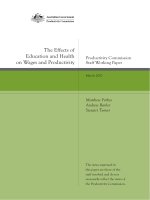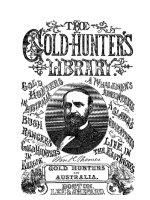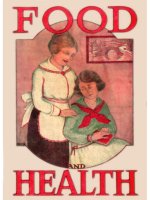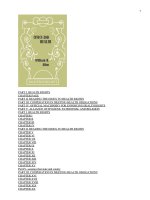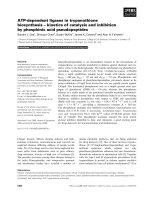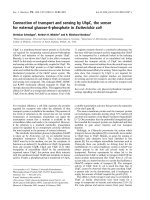EBook of Civics and Health, by William H. Allen pptx
Bạn đang xem bản rút gọn của tài liệu. Xem và tải ngay bản đầy đủ của tài liệu tại đây (12.62 MB, 1,245 trang )
The Project Gutenberg EBook of Civics
and Health, by William H. Allen
This eBook is for the use of anyone
anywhere at no cost and with
almost no restrictions whatsoever. You
may copy it, give it away or
re-use it under the terms of the Project
Gutenberg License included
with this eBook or online at
www.gutenberg.net
Title: Civics and Health
Author: William H. Allen
Contributor: William T. Sedgwick
Release Date: May 8, 2007 [EBook #21353]
Language: English
*** START OF THIS PROJECT GUTENBERG
EBOOK CIVICS AND HEALTH ***
Produced by Jeannie Howse, Juliet
Sutherland and the Online
Distributed Proofreading Team at
Transcriber's Note:
Inconsistent
hyphenation in the
original document has
been preserved.
Some text in this
document has been
moved to avoid multi-
page tables being
inserted mid-
paragraph.
Obvious typographical
errors have been
corrected in this text.
For a complete list,
please see the
end of this document.
Click on the images to
see a larger version.
LOUIS AGASSIZ
"A natural law is as sacred as a
moral principle"
CIVICS AND
HEALTH
BY
WILLIAM H. ALLEN
SECRETARY, BUREAU OF MUNICIPAL RESEARCH
FORMER SECRETARY OF THE NEW YORK
COMMITTEE ON PHYSICAL WELFARE OF
SCHOOL CHILDREN, AUTHOR OF "EFFICIENT
DEMOCRACY" AND "RURAL
SANITARY ADMINISTRATION IN PENNSYLVANIA,"
JOINT AUTHOR
OF "SCHOOL REPORTS AND SCHOOL
EFFICIENCY"
WITH AN INTRODUCTION
BY
WILLIAM T. SEDGWICK
PROFESSOR OF BIOLOGY IN THE MASSACHUSETTS
INSTITUTE OF TECHNOLOGY
GINN AND COMPANY
BOSTON · NEW YORK · CHICAGO ·
LONDON
ENTERED AT STATIONERS' HALL
COPYRIGHT, 1909
BY WILLIAM H. ALLEN
ALL RIGHTS RESERVED
910.4
The Athenæum Press
GINN AND COMPANY ·
PROPRIETORS · BOSTON · U.S.A.
INTRODUCTION
It is a common weakness of mankind
to be caught by an idea and captivated
by a phrase. To rest therewith content
and to neglect the carrying of the idea
into practice is a weakness still more
common. It is this frequent failure of
reformers to reduce their theories to
practice, their tendency to dwell in the
cloudland of the ideal rather than to test
it in action, that has often made them
distrusted and unpopular.
With our forefathers the phrase mens
sana in corpore sano was a high
favorite. It was constantly quoted with
approval by writers on hygiene and
sanitation, and used as the text or the
finale of hundreds of popular lectures.
And yet we shall seek in vain for any
evidence of its practical usefulness. Its
words are good and true, but passive
and actionless, not of that dynamic type
where words are "words indeed, but
words that draw armed men behind
them."
Our age is of another temper. It yearns
for reality. It no longer rests satisfied
with mere ideas, or words, or phrases.
The modern Ulysses would drink life to
the dregs. The present age is dissatisfied
with the vague assurance that the Lord
will provide, and, rightly or wrongly, is
beginning to expect the state to provide.
And while this desire for reality has its
drawbacks, it has also its advantages.
Our age doubts absolutely the virtues of
blind submission and resignation, and
cries out instead for prevention and
amelioration. Disease is no longer
regarded, as Cruden regarded it, as the
penalty and the consequence of sin.
Nature herself is now perceived to be
capable of imperfect work. Time was
when the human eye was referred to as a
perfect apparatus, but the number of
young children wearing spectacles
renders that idea untenable to-day.
Meanwhile the multiplication of state
asylums and municipal hospitals, and
special schools for deaf or blind
children and for cripples, speaks
eloquently and irresistibly of an intimate
connection between civics and health.
There is a physical basis of citizenship,
as there is a physical basis of life and of
health; and any one who will take the
trouble to read even the Table of
Contents of this book will see that for
Dr. Allen prevention is a text and the
making of sound citizens a sermon.
Given the sound body, we have
nowadays small fear for the sound mind.
The rigid physiological dualism implied
in the phrase mens sana in corpore sano
is no longer allowed. To-day the sound
body generally includes the sound mind,
and vice versa. If mental dullness be due
to imperfect ears, the remedy lies in
medical treatment of those organs,—not
in education of the brain. If lack of
initiative or energy proceeds from
defective aëration of the blood due to
adenoids blocking the air tides in the
windpipe, then the remedy lies not in
better teaching but in a simple surgical
operation.
Shakespeare, in his wildwood play,
saw sermons in stones and books in the
running brooks. We moderns find a
drama in the fateful lives of ordinary
mortals, sermons in their physical
salvation from some of the ills that flesh
is heir to, and books—like this of Dr.
Allen's—in striving to teach mankind
how to become happier, and healthier,
and more useful members of society.
Dr. Allen is undoubtedly a reformer,
but of the modern, not the ancient, type.
He is a prophet crying in our present
wilderness; but he is more than a
prophet, for he is always intensely
practical, insisting, as he does, on
getting things done, and done soon, and
done right.
No one can read this volume, or even
its chapter-headings, without surprise
and rejoicing: surprise, that the physical
basis of effective citizenship has hitherto
been so utterly neglected in America;
rejoicing, that so much in the way of the
prevention of incapacity and
unhappiness can be so easily done, and
is actually beginning to be done.
The gratitude of every lover of his
country and his kind is due to the author
for his interesting and vivid presentation
of the outlines of a subject fundamental
to the health, the happiness, and the
well-being of the people, and hence of
the first importance to every American
community, every American citizen.
WILLIAM T. SEDGWICK
Massachusetts Institute of Technology
CONTENTS
PART I. HEALTH RIGHTS
CHAPTER
PAGE
I. Health a Civic
Obligation 3
II. Seven Health
Motives and
Seven
Catchwords 11
III. What Health
Rights are not
enforced in your
Community? 23
IV. The Best Index
to Community
Health is the
Physical Welfare
of School
Children 33
PART II. READING THE INDEX
TO HEALTH RIGHTS
V. Mouth Breathing 45
VI. Catching
Diseases, Colds,
Diseased Glands 57
VII. Eye Strain 72
VIII. Ear Trouble,
Malnutrition,
Deformities 83
IX. Dental Sanitation 89
X. Abnormally
Bright Children 104
XI. Nervousness of
Teacher and
Pupil
107
XII. Health Value of
"Unbossed" Play
and Physical
Training
115
XIII. Vitality Tests and
Vital Statistics 124
XIV. Is your School
Manufacturing
Physical
Defects? 139
XV. The Teacher's
Health 152
PART III. COÖPERATION IN
MEETING HEALTH
OBLIGATIONS
XVI. European
Remedies: Doing
Things at School 159
XVII. American
Remedies:
Getting Things
Done 166
XVIII. Coöperation
with
Dispensaries and
Child-Saving
Agencies 174
XIX. School Surgery
and Relief
Objectionable, if
Avoidable
184
XX. Physical
Examination for
Working Papers 190
XXI. Periodical
Physical
Examination
after School Age
201
XXII. Habits of Health
promote
Industrial
Efficiency 208
XXIII. Industrial
Hygiene 218
XXIV. The Last Days of
Tuberculosis
229
XXV. The Fight for
Clean Milk 252
XXVI. Preventive
"Humanized"
Medicine:
Physician and
Teacher 268
PART IV. OFFICIAL
MACHINERY FOR ENFORCING
HEALTH RIGHTS
XXVII. Departments of
School Hygiene 283
XXVIII. Present
Organization of
School Hygiene
in New York
City
296
XXIX. Official
Machinery for
enforcing Health
Rights 302
XXX. School and
Health Reports 310
XXXI. The Press 322
PART V. ALLIANCE OF
HYGIENE, PATRIOTISM, AND
RELIGION
XXXII. Do-Nothing
Ailments 329
XXXIII. Heredity
Bugaboos and
Heredity Truths
335
XXXIV. Ineffective and
Effective Ways
of Combating
Alcoholism 343
XXXV. Is it Practicable


